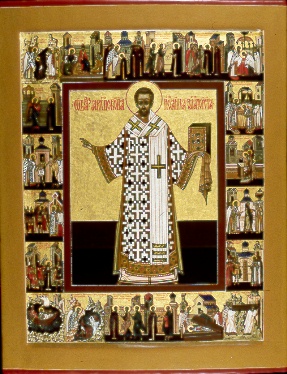|
|||
|---|---|---|---|
| This weekly bulletin insert complements the curriculum published by the Department of Christian Education of the Orthodox Church in America. This and many other Christian Education resources are available at http://dce.oca.org. | |||

Saint John Chrysostom urged Christians to treat the poor as brothers and sisters who not only need but are entitled to their love and care. He would certainly be appalled at seeing people sleeping on cardboard on the sidewalks of our cities. The 2008 movie "Frozen River" features two women who are dangerously close to sidewalk-sleeping poverty. To make money, they turn to illegally smuggling people in the trunk of their car, bringing them across an unpatrolled corridor of the frozen St. Lawrence River from Canada into the US. One of the women is a young widow with a small baby. Family members have taken over the child's care, against her wishes, and she hopes to gather enough money to show that she can care for the baby herself. The other woman is the middle-aged mother of two boys. Their father has abandoned the family and taken all their money, leaving her in fear of losing everything. The movie paints a convincing picture of lives filled with constant worry and the desperation which can cause people to turn to illegal means of getting money. Would Chrysostom say that the two lawbreakers are entirely at fault, or would he insist that a society that allows people to be pushed so close to the edge is at least partly to blame? There is a moment in the movie that shows how fear and worry can not only rob a person of peace, but can make that person oblivious to God's gifts. It involves the baby of a smuggled couple, and the way God generously rewards the two women for their act of simple human decency toward the baby's parents early on Christmas Eve. The act of decency has taken several hours, and now it's well into the night. The younger woman, a Mohawk, recognizes God's gift as the work of "the Creator." But the older woman, benumbed by exhaustion and agitation, can only respond, "All I know is K Mart is closed and I got nothing to put under the tree for my kids." Once again, would Chrysostom criticize the older woman, or would he see in her the tragic effect of a world that treats people coldly and makes them in turn become cold even toward God? At the end of "Frozen River" this same woman who was indifferent to God's gift must make a difficult choice. She struggles, but finally chooses to do what will be costly to her but of great help to the younger woman. And what would Chrysostom say about this? He knew that it is a struggle to put the other person before ourselves; that's why he exhorted his flock so energetically. The woman's struggle to do the right thing, when she herself is in dire circumstances, is one he would have understood. Its outcome is one he might well have applauded. His prayer would commend that woman to God. |
|||
